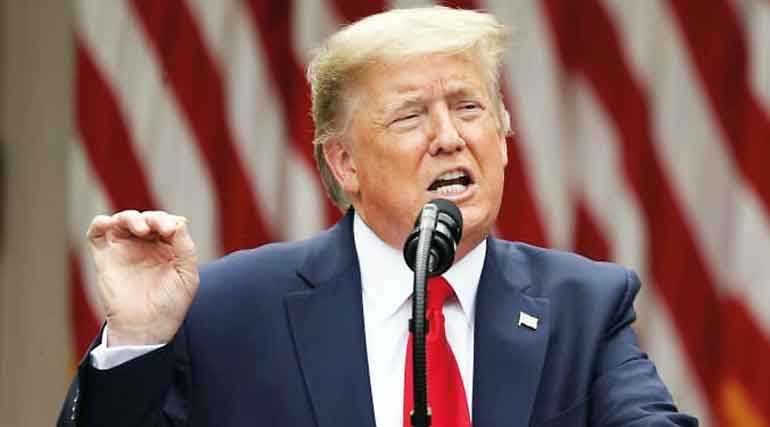Thursday Feb 19, 2026
Thursday Feb 19, 2026
Saturday, 8 August 2020 01:06 - - {{hitsCtrl.values.hits}}

US President Donald Trump
WASHINGTON (Reuters): US President Donald Trump on Thursday unveiled sweeping bans on US transactions with China’s ByteDance, owner of video-sharing app TikTok, and Tencent, operator of messenger app WeChat, in a major escalation of tensions with Beijing.
The executive orders, which go into effect in 45 days, come after the Trump administration said this week it was stepping up efforts to purge “untrusted” Chinese apps from US digital networks and called TikTok and WeChat “significant threats.”
The hugely popular Tiktok has come under fire from US lawmakers and the administration over national security concerns surrounding data collection, amid growing distrust between Washington and Beijing.
On Wednesday, US Secretary of State Mike Pompeo expanded efforts on a program dubbed “Clean Network” to prevent various Chinese apps as well as Chinese telecoms firms from accessing sensitive information on US citizens and businesses.
James Lewis, a technology expert with Washington-based think tank Center for Strategic and International Studies, said the orders appeared coordinated with Pompeo’s announcement.
“This is the rupture in the digital world between the US and China,” he said. “Absolutely, China will retaliate.”
“On TikTok, Trump is clearly putting pressure on Bytedance to close the deal,” Lewis said.
TikTok has 100 million users in the United States. While WeChat is not popular in the country, the app, which has over 1 billion users, is ubiquitous in China. It is also widely used by expat Chinese as a main platform for communications with family and friends as well as a medium for various other services such as games and e-commerce.
WeChat and TikTok were among 59 mostly Chinese apps outlawed in India in June for threatening the country’s “sovereignty and integrity.”
Operator Tencent is China’s second most-valuable company after Alibaba at $ 686 billion. It is also China’s biggest video game company and earlier this summer opened California-based studio.
Its shares fell nearly 10% in Hong Kong after Trump’s order. The yuan CNH=, which is sensitive to Sino-US relations, lost 0.4%.
Tencent and ByteDance declined to comment. Trump issued the orders under the International Emergency Economic Powers Act, a law that grants the administration sweeping power to bar US firms or citizens from trading or conducting financial transactions with sanctioned parties.
US Commerce Secretary Wilbur Ross will identify transactions covered by the prohibition after the orders take effect in mid-September.
New Delhi (Reuters): India has banned some mobile apps of Chinese companies such as Xiaomi Corp and Baidu Inc., three sources told Reuters on Wednesday, in New Delhi’s latest move to hit Chinese companies following a border clash between the neighbours.
India in June outlawed 59 Chinese apps for threatening the country’s “sovereignty and integrity”, including ByteDance’s video-sharing app TikTok, Alibaba’s UC Browser and Xiaomi’s Mi Community app.
Another ban was imposed in recent weeks on about 47 apps which mostly contained clones, or simply different versions, of the already banned apps, the sources said.
Unlike its June move, the government did not make its latest decision public, but there are a few new apps that have made it to that list, including Xiaomi’s Mi Browser Pro and Baidu’s search apps, the sources said.
It wasn’t immediately clear how many new apps have been affected.
India’s IT Ministry and the Chinese Embassy in New Delhi did not respond to a request for comment. China has previously criticised India’s decision to ban the apps.
A spokesman for Xiaomi in India said the company was trying to understand the development and will take appropriate measures. Baidu declined to comment.
A ban on the Mi Browser, which comes pre-loaded on most Xiaomi smartphones, could potentially mean the Chinese firm will need to stop installing it on new devices it sells in India.
Xiaomi is India’s No.1 smartphone seller with close to 90 million users, according to Hong Kong-based tech researcher Counterpoint.
The bans are part of India’s moves to counter China’s dominant presence in the country’s internet services market following a border clash in June between the two nuclear-armed neighbours in which 20 Indian soldiers were killed.
India has also made approval processes more stringent for Chinese companies wanting to invest in the country, and also tightened norms for Chinese companies wanting to participate in government tenders.